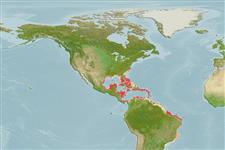>
Holocentriformes (Squirrelfishes, soldierfishes) >
Holocentridae (Squirrelfishes, soldierfishes) > Holocentrinae
Etymology: Holocentrus: Greek, holos = full + Greek, kentron = sting (Ref. 45335).
More on author: Walbaum.
Environment: milieu / climate zone / depth range / distribution range
Ecología
marino asociado a arrecife; rango de profundidad 0 - 32 m (Ref. 3724). Tropical; 36°N - 28°S, 98°W - 31°W
Western Atlantic: Bermuda and southern Florida, USA to northern South America and Brazil; throughout the West Indies (Ref. 3724). Antilles, northwestern Gulf of Mexico, Yucatan to Colombia (Ref. 26938).
Length at first maturity / Tamaño / Peso / Age
Maturity: Lm 13.5 range ? - ? cm
Max length : 35.0 cm TL macho / no sexado; (Ref. 5217); common length : 25.0 cm TL macho / no sexado; (Ref. 5217)
Espinas dorsales (total) : 11; Radios blandos dorsales (total) : 14 - 16; Espinas anales: 4; Radios blandos anales: 9 - 11. Conspicuous white spot behind tip of each dorsal spine (Ref. 26938). Body slender. Upper jaw extending posteriorly to middle of pupil (Ref. 37108). Body bright red or red striped, sometimes blotched (Ref. 7251). Similar in color to H. ascensionis, but each interspinous membrane of dorsal fin with a white spot near margin (Ref. 13442).
Nocturnal (Ref. 37108), inhabits clear reefs (Ref. 5217). Found near mouths of caves and holes (Ref. 26938); at night they usually move to sandy areas and grass beds to feed on crabs, shrimps, gastropods and brittle stars (Ref. 3724). Marketed fresh but not popular as a food fish (Ref. 5217).
Life cycle and mating behavior
Maturities | Reproducción | Spawnings | Egg(s) | Fecundities | Larva
Robins, C.R. and G.C. Ray, 1986. A field guide to Atlantic coast fishes of North America. Houghton Mifflin Company, Boston, U.S.A. 354 p. (Ref. 7251)
IUCN Red List Status (Ref. 130435)
Threat to humans
Reports of ciguatera poisoning (Ref. 30303)
Human uses
Pesquerías: escaso valor comercial; Acuario: Comercial
Herramientas
Special reports
Download XML
Fuentes de Internet
Estimates based on models
Preferred temperature (Ref.
123201): 23.9 - 28.1, mean 27.3 °C (based on 817 cells).
Phylogenetic diversity index (Ref.
82804): PD
50 = 0.7500 [Uniqueness, from 0.5 = low to 2.0 = high].
Bayesian length-weight: a=0.01175 (0.00709 - 0.01948), b=2.89 (2.75 - 3.03), in cm total length, based on LWR estimates for this species & (Sub)family-body (Ref.
93245).
Nivel trófico (Ref.
69278): 3.5 ±0.4 se; based on diet studies.
Generation time: 1.2 ( na - na) years. Estimated as median ln(3)/K based on 1
growth studies.
Resiliencia (Ref.
120179): Alto, población duplicada en un tiempo mínimo inferior a 15 meses (K=0.9).
Fishing Vulnerability (Ref.
59153): Low vulnerability (19 of 100).
Nutrients (Ref.
124155): Calcium = 60 [28, 192] mg/100g; Iron = 0.729 [0.304, 1.443] mg/100g; Protein = 18.8 [17.6, 19.9] %; Omega3 = 0.149 [0.062, 0.348] g/100g; Selenium = 37.2 [22.2, 66.9] μg/100g; VitaminA = 49.5 [19.4, 131.3] μg/100g; Zinc = 1.26 [0.82, 1.95] mg/100g (wet weight);
